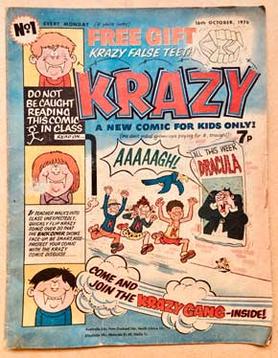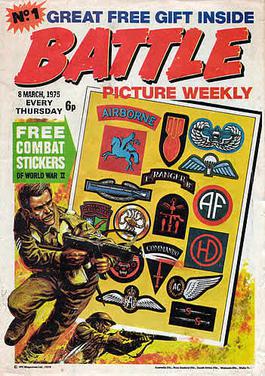Related Research Articles

2000 AD is a weekly British science fiction-oriented comic magazine. As a comics anthology it serialises stories in each issue and was first published by IPC Magazines in 1977, the first issue dated 26 February. Since 2000 it has been published by Rebellion Developments.

A British comic is a periodical published in the United Kingdom that contains comic strips. It is generally referred to as a comic or a comic magazine, and historically as a comic paper. As of 2014, the three longest-running comics of all time were all British.

Whizzer and Chips was a British comics magazine that ran from 18 October 1969 to 27 October 1990, when it merged with the comic Buster. As with most comics of the time, Whizzer and Chips was dated one week ahead of the day it actually appeared on newsstands in Great Britain. It had no relation to the earlier British comic Illustrated Chips.
Jackpot was a British comic book magazine that ran from the issues cover dated 5 May 1979 to issue 141, 30 January 1982, when it merged with Buster.

Monster Fun was originally a weekly British comic strip magazine for children aged seven to twelve. Published by IPC Media, it ran for 73 issues in 1975–1976, when it merged with Buster. Focused on humorous monster strips and stories, the magazine was known for "The Bad Time Bedtime Books" minicomic inserts, created by Leo Baxendale.

Krazy was a British comic book magazine published every Monday by IPC Magazines Ltd. It ran from 16 October 1976 to 15 April 1978, when it merged with stable-mate Whizzer and Chips. In 1977, one of the characters in the comic, Cheeky, proved popular enough to get his own comic, Cheeky, which was later merged into Whoopee!. The comic included a "disguise" back-cover, such as the cover of a diary or brochure, which allowed readers to hide the comic from parents or teachers.

Wow! is a British comic book magazine running for 56 issues from 5 June 1982 to 25 June 1983, when it merged with Whoopee!.
Whoopee! was a British comic book magazine that ran from 9 March 1974 to 30 March 1985, when it merged with Whizzer and Chips. It was published by IPC Magazines Ltd and ran for 572 issues.
Shiver and Shake was a British comic magazine published every Monday by IPC Magazines Ltd. It ran from 10 March 1973 to 5 October 1974, when it merged with Whoopee! As often happens with British comics, many names of strips were a play on popular television programmes and films of the time. The theme of the strips were mainly horror ; similar to the later Monster Fun; indeed, Frankie Stein appeared in both comics.
The 12½p Buytonic Boy was a British comic strip, created by Robert Nixon, although Brian Walker frequently deputised when Bob was on leave. It debuted as "Half a Dollar Boy" in issue 37 of Monster Fun comic, before becoming a regular feature in the first issue of the magazine Krazy, dated 16 October 1976.

Battle Picture Weekly was a British weekly boys' war comic published by IPC Magazines from 8 March 1975 to 23 January 1988, when it merged with the new incarnation of Eagle after 644 issues. Most stories were set in World War II, with some based on other conflicts, while factual features also focused on warfare.

Starlord was a British weekly boys' science fiction comic published by IPC Magazines from 13 May to 7 October 1978, when it merged with 2000 AD after 22 issues. The comic was created by Kelvin Gosnell, and was originally intended as a fortnightly sister title for 2000 AD with higher production values and an older audience, but late changes in production saw it converted into a weekly.

Tiger was a weekly British comics periodical published by Amalgamated Press, Fleetway Publications and IPC Magazines from 11 September 1954 to 30 March 1985. The title was initially launched in a large tabloid size to mimic newspapers; while it featured some action-adventure stories Tiger contained a large number of sport strips. The most famous of these was "Roy of the Rovers", which debuted in the first issue and was the comic's most popular feature, eventually transferring to its own comic in 1975. Tiger would go on to become one of the company's longest-running titles, with 1,573 issues published before being merged with Eagle in 1985. Over the course of its run, Tiger featured columns by numerous famous sports figures, including Ian Botham, Geoff Boycott, Tony Greig, Trevor Francis and Charlie Nicholas.
Mustapha Million was a British gag-a-day comic strip, created by Reg Parlett. It appeared in Cheeky Weekly in its first issue on 22 October 1977. The magazine would later merge with Whoopee! and on its turn with Whizzer and Chips, while the comic ran in those magazines as well.
Scorcher was the name of a football-themed British comic magazine published by IPC between January 1970 and October 1974. Scorcher featured various well-known comic strips, such as Billy's Boots, Bobby of the Blues and Lags Eleven, a story about a prison football team. In addition, the Nipper strip was absorbed from the Score comic, and Hot Shot Hamish made its first appearance after that. Some of these stories later found homes in Roy of the Rovers and in Tiger.

Smash! was a weekly British comic book, published initially by Odhams Press and subsequently by IPC Magazines, from 5 February 1966 to 3 April 1971. After 257 issues it merged into Valiant.
Trevor Metcalfe is a British illustrator and comic book artist known for his comic strips in IPC Magazines comics such as Sweet Tooth and Junior Rotter in Whizzer and Chips.
Chalky was a British comic book character from Cor!!, and from 22 June 1974 when the publications were merged, Buster, both published by IPC. Chalky was created and first drawn by Terry Bave in the 24 July 1971 issue of Cor!. He was more regularly drawn by Dick Millington and Gordon Hill.
Richie Wraggs is a fictional comic strip character in the British comic Jackpot. He appears with his black cat, Lucky.
Street Enterprises was a publishing company that focused on reprints of newspaper comic strips from the United States and the United Kingdom. Operating from 1971–1984, Street Enterprises is most known for the sister publications The Menomonee Falls Gazette and The Menomonee Falls Guardian, as well as for taking over publication of the comics news-zine The Comic Reader.
References
- 1 2 3 4 Kibble-White, Graham (2005). The Ultimate Book of British Comics. Allison & Busby Limited. ISBN 0-7490-8211-9.
- ↑ "Cheeky, issue dated 2 February 1980." IPC
- ↑ Crikey! (11). Sequential Media.
{{cite journal}}: Missing or empty|title=(help) - ↑ "Cheeky issue dated 30 September 1978." IPC
- ↑ "Whoopee and Cheeky, issue dated 9 February 1980." IPC
- ↑ "Toonhound web site."
- ↑ "Whoopee and Cheeky, issue dated 16 February 1980." IPC
- ↑ "Whoopee and Cheeky" Issue dated 25 July 1981." IPC
- ↑ "Whoopee and Cheeky" Issue dated 25 September 1981." IPC